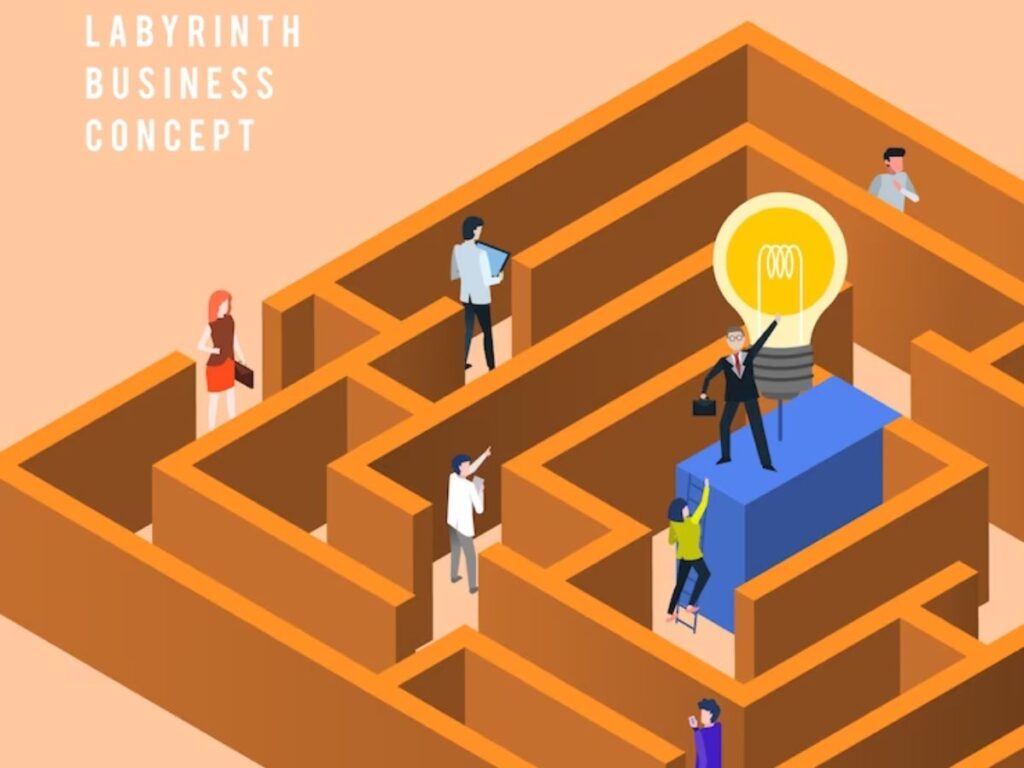Hey there, fellow escape room enthusiasts! If you’re anything like us, you always look for ways to conquer your next escape room challenge.
Then let’s dive right in and see what it takes to improve those success rates!
What are Escape Rooms?
In the exhilarating world of escape rooms, or some might call it a mystery escape room, teams of players join forces in a real-life, interactive adventure, tackling enigmatic puzzles and unraveling riddles to break free from a captivating themed environment, all within a ticking clock’s constraints.
Fun activities for team building in Hyderabad.
What Are The Common Elements Of An Escape Room Experience?
Explore the key components that make these immersive, interactive adventures a thrilling test of wits and teamwork.
- Themed Environments: Each escape room typically has a unique theme or storyline, creating an immersive atmosphere for players.
- Puzzles and Riddles: Various logic-based, physical, and observational puzzles and riddles challenge players to think creatively and work collaboratively.
- Time Limit: Escape rooms generally impose a time limit, often around 60 minutes, adding a sense of urgency and excitement to the experience.
- Teamwork: Players must work together, communicate effectively, and leverage individual strengths to solve the challenges presented.
- Clues and Hints: If a team gets stuck, they can request clues or hints from the game master to help them progress in the game.
- Game Master: A staff member, also known as a game master or moderator, monitors the game, provides hints when needed, and ensures players’ safety and enjoyment.
- Progression: Escape rooms often feature a linear or non-linear progression, with players unlocking new areas, discovering hidden items, or revealing further clues as they solve challenges.
- Win/Loss Conditions: To successfully “escape,” teams must complete the objectives within the time limit. Failure to do so results in a loss but can still provide a fun and engaging experience.
The beginner’s guide to escaping an escape room.

Why do people go to escape rooms?
People go to escape rooms for a variety of reasons.
- Entertainment: Escape rooms offer a unique, immersive form of entertainment that blends elements of gaming, theatre, and puzzle-solving in a live-action setting.
- Socialisation: Escape rooms are an excellent way to spend quality time with friends, family, or colleagues, as they promote teamwork, communication, and bonding through shared experiences.
- Challenge: Participants enjoy the intellectual stimulation and problem-solving aspects of escape rooms, which test their creativity, logic, and critical thinking skills.
- Adventure: The themed environments and storylines in escape rooms create a sense of adventure and excitement, allowing participants to temporarily escape from reality and immerse themselves in a different world.
- Competition: Some people are drawn to escape rooms for the competitive aspect, seeking to complete the challenges within the time limit and comparing their performance with other teams.
- Skill development: Escape rooms can help participants develop valuable skills, such as communication, decision-making, leadership, and time management, which can be applied in various aspects of life.
- Novelty: For many, the unique and ever-changing nature of escape rooms, with new themes and puzzles to explore, keeps them coming back for more experiences.
15 instagrammable places in Hyderabad.
The Psychology Behind Escape Rooms
The psychology behind escape rooms involves stimulating cognitive, emotional, and social aspects of human behaviour.
By immersing players in challenging and problem-solving scenarios, escape rooms appeal to curiosity, promote teamwork, enhance critical thinking skills, and elicit a sense of achievement upon successfully completing the tasks.
What to do when you panic in an escape room.
How Does Being In An Escape Room Challenge Your Mind And Test Your Problem-Solving Skills?
Being in an escape room challenges your mind. It tests your problem-solving skills by presenting a series of interconnected puzzles, riddles, and obstacles that require critical thinking, creativity, and pattern recognition.
Participants must work under time constraints, collaborate with teammates, and adapt to new information, pushing their cognitive abilities to solve complex problems in an immersive and stimulating environment.
Elaborating on the difficulty levels in an escape room.
How Does Physical Activity Factor Into A Successful Escape Room Experience?
Physical activity factors into a successful escape room experience by requiring players to interact with their environment, search for hidden clues, and perform tasks that involve spatial awareness and dexterity.
While not typically as demanding as sports or fitness activities, the physical aspect of escape rooms complements the mental challenges, creating a more engaging and immersive experience that requires players to think on their feet and use their bodies to solve problems .
Everything you need to know about solving escape room puzzles.
Effects That Team Dynamics Have On The Success Rate Of An Escape Room Experience
Team dynamics significantly impact the success rate of an escape room experience, as effective communication, diverse skill sets, and balanced collaboration among team members contribute to efficient problem-solving.
Positive dynamics foster a supportive environment that encourages sharing ideas. In contrast, negative dynamics, such as conflicts or lack of participation, can hinder progress and reduce the likelihood of successfully escaping within the given time limit.
Exploring success rates and completion times in escape rooms.

Factors That Affect Success Rates
Success rates in various pursuits can be influenced by a multitude of factors, both internal and external. Understanding and addressing these key determinants can enhance performance, paving the way for achievement and growth.
- Difficulty level
- Easier rooms have higher success rates
- Harder rooms challenge even experienced players
- Team size
- Smaller teams can struggle with too many puzzles
- Larger teams risk miscommunication and confusion
- Time limit
- Shorter time limits increase the pressure
- Longer time limits allow for more thorough problem-solving
- Experience level of players
- First-time players may feel overwhelmed
- Seasoned players are more likely to succeed
Top places to visit in Banjara Hills.
What is the typical success rates of escape room?
Typical success rates in escape rooms tend to vary depending on factors such as difficulty level and puzzle design but generally fall between 20% and 40% . This range reflects the challenge and intrigue that draw players to the escape room experience.
If escape rooms look difficult to you, head here to explore creative alternatives for escape rooms. And still, we would suggest you try out a beginner-level escape room instead of jumping to a conclusion!

Strategies for Improving Escape Room Success Rates
Elevating escape room success rates can greatly enhance player satisfaction and enjoyment. Employing effective strategies, from team collaboration to logical approaches, can optimise the overall experience and increase the chances of winning.
- Choose a balanced team with diverse skills
- Identify individual strengths and weaknesses to assign roles
- Effective communication is key to solving puzzles
- Ensure that team members get along well
- Plan ahead and establish goals for the team
- Gather information about the escape room’s theme and puzzles
- Learn about common escape room puzzles and codes
- Determine a strategy for approaching puzzles
- Assign specific tasks to team members
- Keep track of solved and unsolved puzzles
- Allocate time wisely and avoid getting stuck on one puzzle
- Ask for hints when stuck
- Do not underthink, and do not overthink as well
- Look for puzzles in every corner of the room
- Sometimes a clue is hidden in plain sight
- Move on to the next clue if you are stuck on one
More tips and tricks to win in escape room games.

Common Mistakes and Pitfalls to Avoid While Playing Escape Room Games
Mastering escape rooms requires strategy and teamwork. Avoid these common mistakes and pitfalls to enhance your chances of success and improve your overall experience.
- Overthinking puzzles: Keep solutions simple and avoid getting lost in complex theories.
- Poor communication: Actively share findings and ideas with your team to solve puzzles faster.
- Ignoring hints: Be open to using hints when stuck, as they can save valuable time.
- Focusing on one puzzle: Don’t fixate; if stuck, switch with teammates or try another puzzle.
- Disorganisation: Keep found clues and solved puzzles organised to avoid confusion.
- Not using teamwork: Collaborate and divide tasks to tackle challenges efficiently.
- Overlooking details: Pay attention to the room’s design and elements, as subtle hints may be hidden.
What to wear and bring to an escape room.

Weaknesses of Escape Rooms
Escape rooms, while engaging and thrilling, can face limitations regarding accessibility and puzzle design. These weaknesses can impact player experience, hindering the entertainment value of the activity.
- Limited accessibility for individuals with disabilities.
- Varying quality in puzzle design and immersion.
- Risk of frustrating or overly challenging scenarios.
- Potential lack of originality due to overused themes.
- Inconsistent moderation leading to varying levels of support.
10 team outing resorts in Hyderabad.
So there you have it! By understanding the psychology behind escape rooms, focusing on teamwork, and avoiding common mistakes, you’ll be well on your way to boosting your success rates.
Remember, practice makes perfect, so don’t be afraid to try, try again!
As escape rooms continue to grow in popularity, we can expect new innovations and challenges, such as virtual reality experiences, evolving storylines, and even more immersive environments.
So buckle up, escape room aficionados—there’s no telling what thrilling adventures await us in the future!
And if you are in and around Hyderabad, do drop by our facility at Aztec Towers, 3rd Floor, 6-3-249/6/1, Rd Number 1, beside Taj Krishna, Banjara Hills, Hyderabad at Lock N Escape! We provide various themes and games of 80 minutes and celebrations of your special occasions as well!
Cheers!

FREQUENTLY ASKED QUESTIONS
What percentage of people fail at escape rooms?
As for the percentage of people who fail at escape rooms, there isn’t a one-size-fits-all number. Escape room success rates can vary significantly based on factors like room difficulty, participants’ experience, and group dynamics. On average, though, about 50% of groups manage to escape. So, the flip side of that coin is that roughly 50% of folks don’t make it out in time! Talk about a nail-biter!
PS: When the group cannot solve the puzzles before time runs out, is when the mission is not completed or the group fails to complete the mission. In this case, the group is escorted out when the time finishes.
Can you fail an escape room?
Absolutely! But don’t let that get you down. The whole point of escape rooms is to have a blast while putting your brain to the test. Even if you don’t “escape,” you’ll still walk away with a memorable experience and a healthy dose of camaraderie. And hey, there’s always next time, right?
Why are people obsessed with escape rooms?
Escape room games are the ultimate adventure. Adventurers love the thrill of the ticking clock, and the sense of accomplishment is quite satisfying. They are interesting and mysterious at the same time, giving a fun and competitive element.
Why do some people not like escape rooms?
On the other hand, some people might not be as keen on escape rooms. For one, they can be a bit claustrophobic – the name “escape room” doesn’t exactly scream “wide-open spaces,” now does it? Additionally, the time pressure and group dynamics can make things stressful, particularly for those who prefer a more laid-back atmosphere. Finally, escape rooms may not be everyone’s cup of tea simply because they’re not into puzzles or problem-solving games.

